#History Review
Explore tagged Tumblr posts
Text
Why Do the British Drive on the Left? (A History Review)
—Curated By The Collector

The majority of today’s nations today drive on the right side of the road, following the rules of right-hand traffic, or RHT, including the United States, Canada, Russia, and much of Europe. But around one-third of the world’s countries buck the trend with left-hand traffic rules, or LHT. The United Kingdom is one of these nations. In fact, the UK 🇬🇧 has a long history of following LHT that dates way back into British history, perhaps even as far as the ancient Romans. But why do the British drive on the left, rather than following the widespread trend for the opposite? Read on to find out more.
Roman Custom
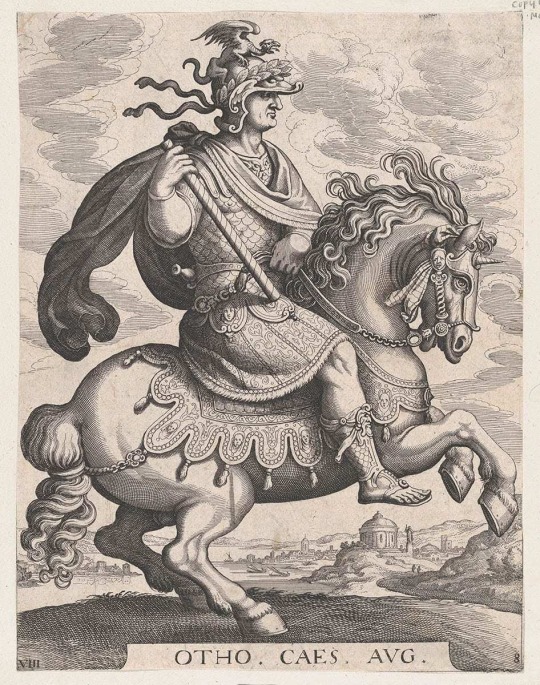
Emperor Otho on Horseback, from ‘The First Twelve Roman Caesars’, Anotonio Tempesta, 1596, Met Museum
One of the most widely circulated theories about why the British drive on the left dates back to ancient Roman times, even before cars and designated roads existed. Back then, travelers riding on horseback faced the constant threat of invasion or mugging. Because the majority of Roman people were right-handed, riding horses on the left meant their right, dominant hand could be ready to draw out a sword in the event of an unexpected rival riding towards them. History suggests Roman soldiers kept up the tradition in larger groups by always marching to the left. The practice was passed on by subsequent civilizations through the ages.
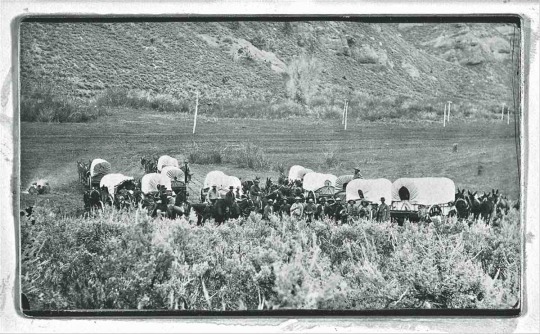
The Salt Lake Cutoff, Charles Carter photo, via True West Magazine
In other nations, particularly Canada 🇨🇦 and the United States 🇺🇸, meanwhile, goods were often transported on large wagons driven by multiple horses. Drivers would sit on the left, and whip their horse with their right hand. Riding on the right side of the road meant drivers could see oncoming traffic more easily, and avoid whipping anyone who crossed their path. The practice of driving on the right thereby became common practice.
It Was Written into British Law

Portrait of Pope Boniface VIII, who first recorded official British driving rules
The first officially sanctioned rule for driving on the left was enshrined by Pope Boniface VIII in 1300 CE, when he declared that all traveling pilgrims visiting the Roman Empire must remain on the left. In 1773, as British roads became more developed and congested, the government brought in the General Highways Act, which stated that all horse riders, farmers, coachmen and lawless highwaymen must remain on the left side to avoid any nasty collisions, even before cars had been invented. Just over a century later, the 1883 Highway Act wrote British driving rules into law, making it a crime for anyone caught driving on the wrong side, even though no one was riding around with swords on the roads by now.
British Cars Were Designed with Drivers on the Right

The interior of a classic British car showing the driver’s seat on the right side
One of the trickiest aspects of adopting different driving rules from one country to the next is adjusting to driving on the other side of the car. British cars were, and are, designed with the driver’s seat to the right, so that the driver riding on the left side of the road can see the traffic coming ahead in the opposite direction. This is often referred to as right-hand driving (not to be confused with right-hand traffic). By contrast, right-driving nations sit on the left side, thereby partaking in left-hand driving.
The Tradition Has Stuck Because Britain Is an Island

The United Kingdom and Ireland as seen from the air
One of the reasons why British 🇬🇧 people still drive on the left is because they are an island nation, with no neighboring right-hand traffic countries. By contrast, various countries who are neighbors to right-hand traffic nations have adopted their rules to make traveling from one country to the next easier, there was no need for Britain to adopt any changes since it sits as an isolated island. Several of the other left-hand driving nations are also islands, including Australia 🇦🇺, Japan 🇯🇵 and Malta 🇲🇹.
#British Driving#History Review#The Collector#LHS | RHS#Ancient Roman Times#Roman Soldiers#Canada 🇨🇦 | United States 🇺🇸#British Law#Pope Boniface VIII#General Highways Act#British Car Design#British | An Island#Australia 🇦🇺 | Japan 🇯🇵 | Malta 🇲🇹
3 notes
·
View notes
Text
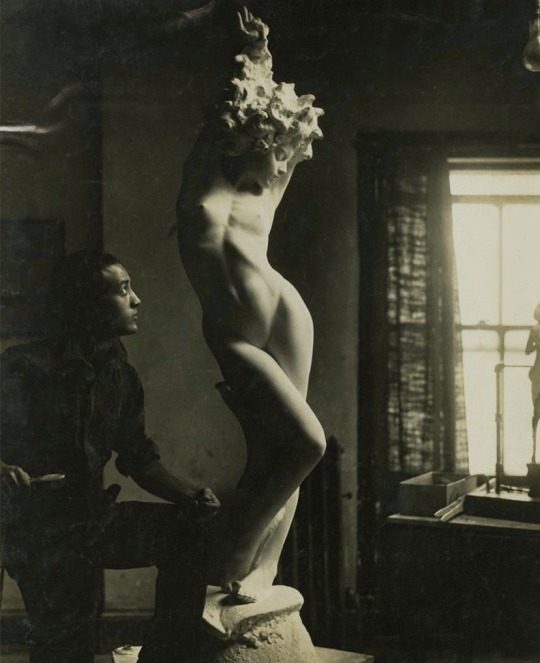
Undine (sculpture), 1904 - 1988.
by Isamu Noguchi.
#bookish#book review#reading#books#poetry#authors#book blog#booklr#writing#studyblr#book worm#books & libraries#greek mythology#history#art#art history#art blog#art gallery#art aesthetic#english literature#english#vintage#dark academia#academia#light academia#cottagecore#aesthetic#education#punk academia#art museum
2K notes
·
View notes
Text
people who don't study history will simply never understand the joy of reading historian beef. there's nothing like it
#when they're reviewing each other's work and they're just SHITTING ON IT????? wonderful#when you can tell the historian HATES whichever historical figure(s) they're writing about? incredible#one thing we must remember is that historians are just academic gossipers xx#what is JSTOR for if not to read the DRAMA#reading an absolutely SCATCHING rebuttal of an article on New England migration and honestly??? having a wonderful time#sometimes the history student just jumps out#history
5K notes
·
View notes
Text
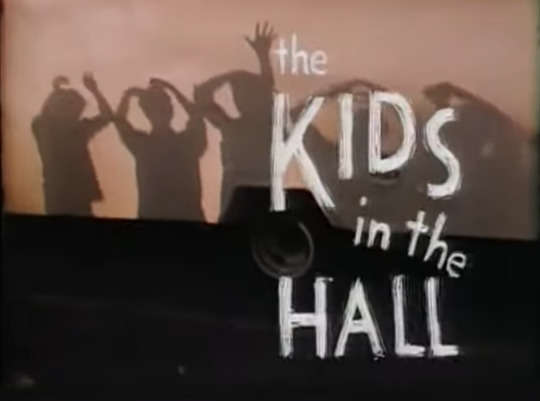


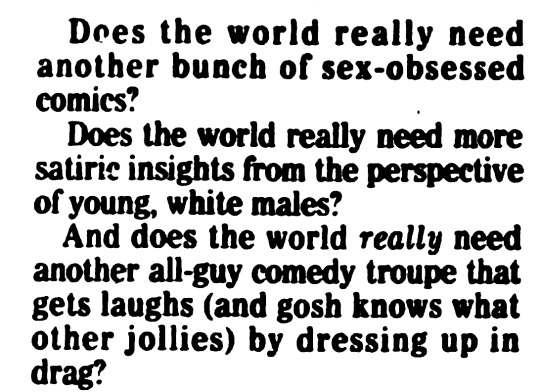

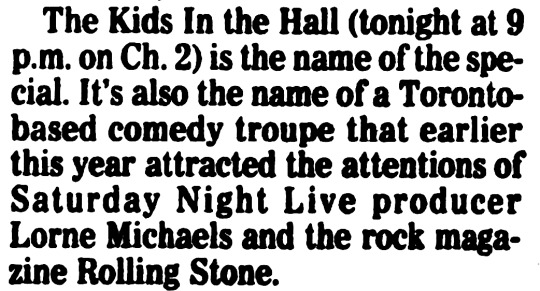

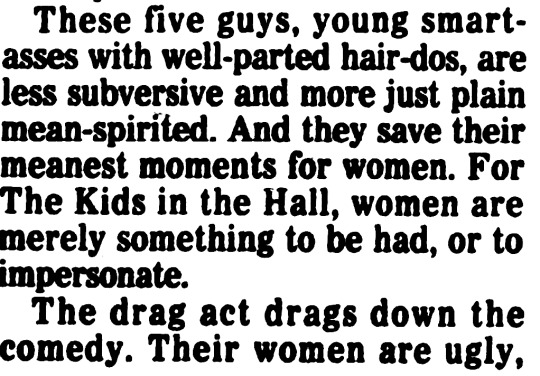

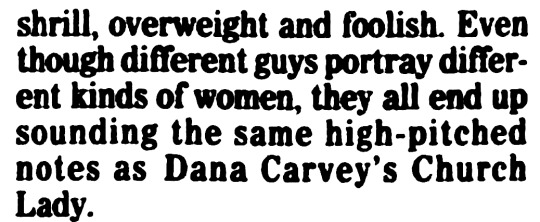

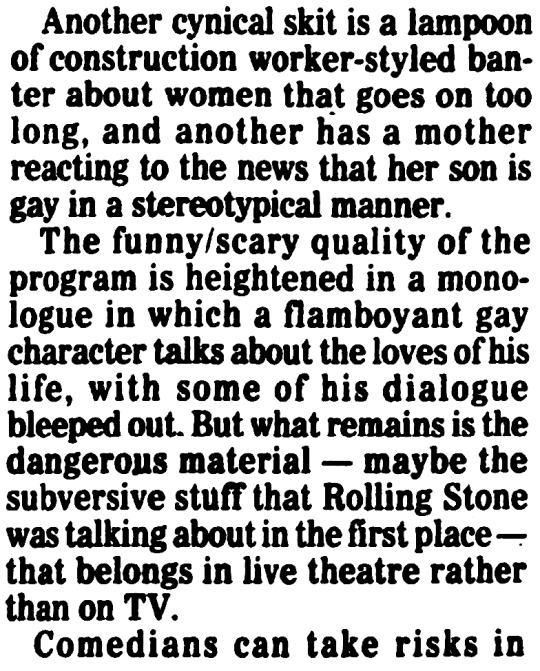

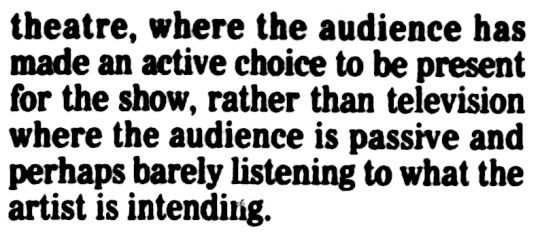
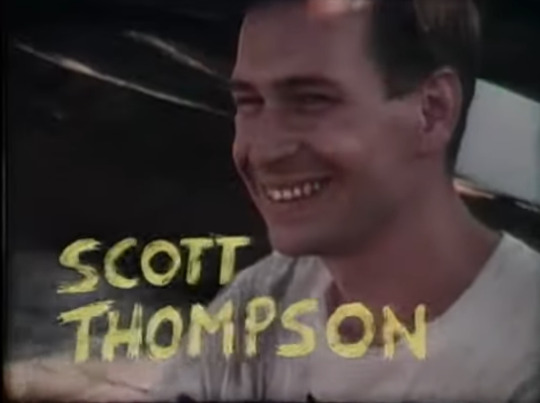
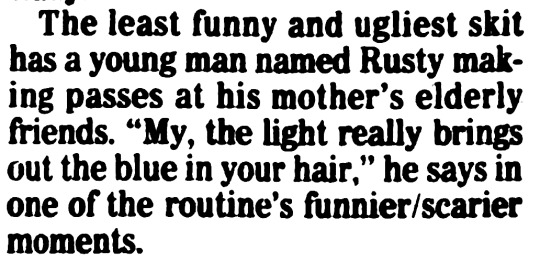

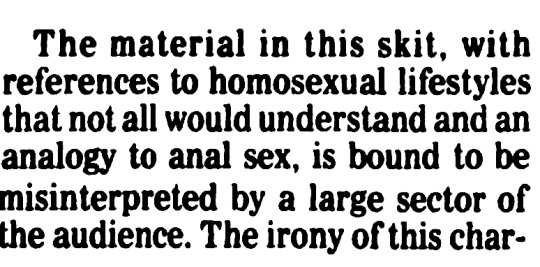

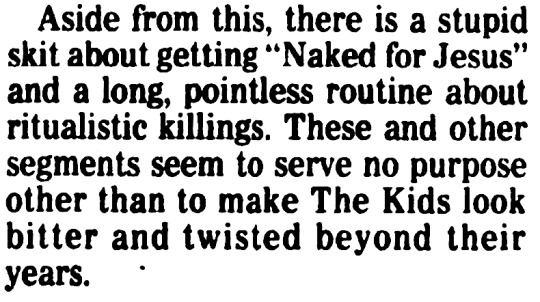

December 1988.
The Vancouver Sun reviews a new program called The Kids in the Hall
#the kids in the hall#kids in the hall#cbc#bad reviews#history of canadian comedy#canadian#dave foley#scott thompson#kevin mcdonald#bruce mcculloch#mark mckinney
1K notes
·
View notes
Text

Book review: Goddesses, Whores, Wives & Slaves by Sarah B Pomeroy (1975)
10/10
This was impossible to put down. A fascinating and vibrant history of Ancient Greek and Roman Women: from all walks of life, using just about every resource available within art and archaeology and anthropology.
It’s also also very very well researched and informative with a HUGE bibliography and a great index and lots of notes for the nerdy (aka me) who has already highlighted the next set of books to chew on.
Overall she argues (and does so persuasively with a great deal of thought and objectivity) that Roman women seemed to have enjoyed a higher quality of life than the Ancient Greek women because of generally (especially in upper class households) having a more public-facing life, being slightly more protected by the pater familias model of the Roman household, and having slightly more social mobility.
However a shout out goes to the Amazons and their social model for living 🏹🏹🏹
If you’re curious about the roles of women in varying Hellenistic and classical contexts, this is a must-read.
Her final words are so interesting and prescient too: “Serious intellectual thought about women continued: Stoicism, the most popular of the Hellenistic and Roman philosophies, directed women’s energies to marriage and motherhood. The argumentation is brilliant and difficult to refute. And this rationalized confinement of women to the domestic sphere, as well as the systemization of anti-female thought by poets and philosophers, are two of the most devastating creations in the classical legacy” 😢💔
Also, if you’re upset by reading about things like sexual slavery and infanticide, it might not be the book for you.
Overall, it’s staying in my collection and I’ll definitely be referring to it again.
#feminism#terfblr#radical feminist safe#radical feminist#andrea dworkin#radical feminism#book review#book recommendations#feminist books#feminist book review#history#ancient history#women’s history
416 notes
·
View notes
Text
guys will say things like "death is the mother of beauty" and then not know what tf this is
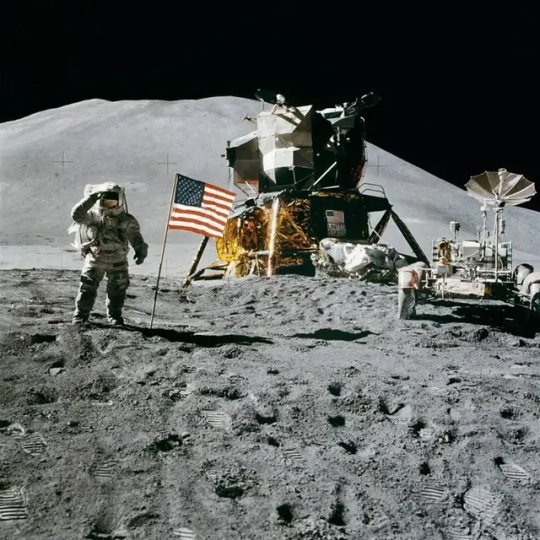
#the secret history#henry winter#richard papen#francis abernathy#camilla macaulay#charles macaulay#bunny corcoran#donna tartt#literature#book review#beauty is terror
800 notes
·
View notes
Text
A taxonomy of corporate bullshit
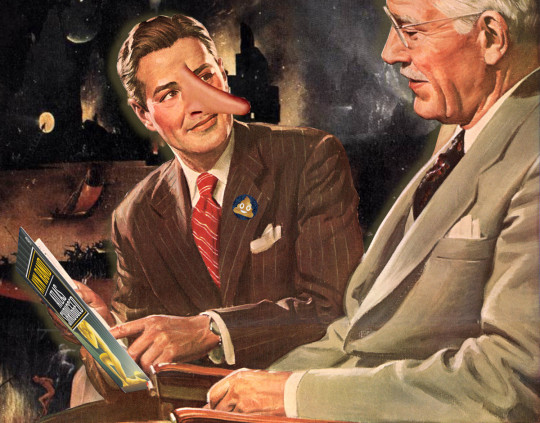
Next Tuesday (Oct 31) at 10hPT, the Internet Archive is livestreaming my presentation on my recent book, The Internet Con.

There are six lies that corporations have told since time immemorial, and Nick Hanauer, Joan Walsh and Donald Cohen's new book Corporate Bullsht: Exposing the Lies and Half-Truths That Protect Profit, Power, and Wealth in America* provides an essential taxonomy of this dirty six:
https://thenewpress.com/books/corporate-bullsht
In his review for The American Prospect, David Dayen summarizes how these six lies "offer a civic-minded, reasonable-sounding justification for positions that in fact are motivated entirely by self-interest":
https://prospect.org/culture/books/2023-10-27-lies-my-corporation-told-me-hanauer-walsh-cohen-review/
I. Pure denial
As far back as the slave trade, corporate apologists and mouthpieces have led by asserting that true things are false, and vice-versa. In 1837, John Calhoun asserted that "Never before has the black race of Central Africa, from the dawn of history to the present day, attained a condition so civilized and so improved, not only physically, but morally and intellectually." George Fitzhugh called enslaved Africans in America "the freest people in the world."
This tactic never went away. Children sent to work in factories are "perfectly happy." Polluted water is "purer than the water that came from the river before we used it." Poor families "don't really exist." Pesticides don't lead to "illness or death." Climate change is "beneficial." Lead "helps guard your health."
II. Markets can solve problems, governments can't
Alan Greenspan made a career out of blithely asserting that markets self-correct. It was only after the world economy imploded in 2008 that he admitted that his doctrine had a "flaw":
https://www.pbs.org/newshour/show/greenspan-admits-flaw-to-congress-predicts-more-economic-problems
No matter how serious a problem is, the market will fix it. In 1973, the US Chamber of Commerce railed against safety regulations, because "safety is good business," and could be left to the market. If unsafe products persist in the market, it's because consumers choose to trade safety off "for a lower price tag" (Chamber spox Laurence Kraus). Racism can't be corrected with anti-discrimination laws. It's only when "the market" realizes that racism is bad for business that it will finally be abolished.
III. Consumers and workers are to blame
In 1946, the National Coal Association blamed rampant deaths and maimings in the country's coal-mines on "carelessness on the part of men." In 2003, the National Restaurant Association sang the same tune, condemning nutritional labels because "there are not good or bad foods. There are good and bad diets." Reagan's interior secretary Donald Hodel counseled personal responsibility to address a thinning ozone layer: "people who don’t stand out in the sun—it doesn’t affect them."
IV. Government cures are always worse than the disease
Lee Iacocca called 1970's Clean Air Act "a threat to the entire American economy and to every person in America." Every labor and consumer protection before and since has been damned as a plague on American jobs and prosperity. The incentive to work can't survive Social Security, welfare or unemployment insurance. Minimum wages kill jobs, etc etc.
V. Helping people only hurts them
Medicare will "destroy private initiative for our aged to protect themselves with insurance" (Republican Senator Milward Simpson, 1965). Covid relief is unfair to people that are currently in the workforce" (Republican Governor Brian Kemp, 2021). Welfare produces "learned helplessness."
VI. Everyone who disagrees with me is a socialist
Grover Cleveland's 2% on top incomes is "communistic warfare against rights of property" (NY Tribune, 1895). "Socialized medicine" will leave "our children and our children’s children [asking] what it once was like in America when men were free" (Reagan, 1961).
Everything is "socialism": anti-child labor laws, Social Security, minimum wages, family and medical leave. Even fascism is socialism! In 1938, the National Association of Manufacturers called labor rights "communism, bolshevism, fascism, and Nazism."
As Dayen says, it's refreshing to see how the right hasn't had an original idea in 150 years, and simply relies on repeating the same nonsense with minor updates. Right wing ideological innovation consists of finding new ways to say, "actually, your boss is right."
The left's great curse is object permanence: the ability to remember things, like the fact that it used to be possible for a worker to support a family of five on a single income, or that the economy once experienced decades of growth with a 90%+ top rate of income tax (other things the left manages to remember: the "intelligence community" are sociopathic monsters, not Trump-slaying heroes).
When the business lobby rails against long-overdue antitrust action against Amazon and Google, object permanence puts it all in perspective. The talking points about this being job-destroying socialism are the same warmed-over nonsense used to defend rail-barons and Rockefeller. "If you don't like it, shop elsewhere," has been the corporate apologist's line since slavery times.
As Dayen says, Corporate Bullshit is a "reference book for conservative debating points, in an attempt to rob them of their rhetorical power." It will be out on Halloween:
https://bookshop.org/a/54985/9781620977514

If you'd like an essay-formatted version of this post to read or share, here's a link to it on pluralistic.net, my surveillance-free, ad-free, tracker-free blog:
https://pluralistic.net/2023/10/27/six-sells/#youre-holding-it-wrong
#pluralistic#corporate bullshit#lies#books#reviews#taxonomies#labor#denialism#consumerism#Nick Hanauer#Joan Walsh#Donald Cohen#history#object permanence#taking the right seriously
843 notes
·
View notes
Text
Ten must-read books for writers (or anyone, really.)
By Writerthreads on Instagram
Obviously this list is highly subjective and based on my research and personal experience. Please share your favourite books as well!!
1. To the Lighthouse by Virginia Woolf
Woolf is the queen of the stream of consciousness and a master at diving into characters' inner thoughts, conveying complex emotions, themes and perspective. Her prose is breathtaking, her character memorable.
2. Beloved by Toni Morrison
Morrison tackles difficult themes with poise like no other, diving into topics like grief, trauma, and identity. Read this book to learn how to develop multi-layered narratives whilst maintaining perfect pacing and a intricate narrative structure.
3. The Great Gatsby by F. Scott Fitzgerald
A masterpiece. Sharp social commentary, eloquent prose and vivid imagery... what more can you want from a book? Every word was chosen for a purpose, and it shows the importance of restraint in writing.
4. The Lord of the Rings by J. R. R. Tolkien
Tolkien's legendary fantasy world-building makes his series a staple in fantasy literature. The geography, cultures and histories in his works are well-crafted. Anyone trying to build a complex world can learn from from this series.
5. Mrs. Dalloway by Virginia Woolf
Our second Woolf classic in this list! Mrs. Dalloway is a masterclass of a perfect character study. Woolf weaves different viewpoints intricately, capturing the essence of human experience.
6. Pride and Prejudice by Jane Austen
Austen character development is legendary, showcasing complex, evolving characters like Elizabeth Bennet and Mr. Darcy. The novel’s witty dialogue show insight into personality and societal norms, and her narrative voice and well-structured plot keeps readers hooked to the very end.
7. Never Let Me Go by Kazoo Ishiguro
Ishiguro’s novel presents a quietly devastating exploration of memory, identity, and humanity through a dystopian lens. The subtle, restrained prose and profound emotional impact illustrate how to weave complex themes into a seemingly simple narrative.
8. The Seven Husbands of Evelyn Hugo by Taylor Jenkins Reid
This book made me cry so very hard. The author explored themes like identity and fame, while creating an engaging and multi-layered plot that had me hooked. Reid’s vivid prose showcases techniques for creating emotionally resonant and storytelling that allows readers to feel for the characters.
9. One Hundred Years of Solitude by Gabriel Garcia Marquez
Márquez’s masterpiece provides a gorgeous, profound exploration of magical realism. Its intricate narrative and richly imagined world blends fantastical elements with real-world themes into something unique and breathtaking.
10. Wuthering Heights by Emily Bronte
Brontes exploration of dark themes, framed within a dark and brooding narrative, makes it the quintessential gothic read. It's emotionally intense, complex in structure, and definitely memorable, perfect for any budding writer dabbling in dark academia, modern gothic literature, horror, etc.
And here's my rather shoddy list from a non-English major who reads too much! And Sorry for the lack of accents on the required letters, I haven't figured out how to add them on my laptop. Please give me a general opinion on my book recs and whether they're good, or if you have more suggestions! Lots of love.
#books#book recs#booklr#writing#writers on tumblr#writing tips#writing advice#teen writer#writeblr#writers#writing inspiration#creative writing#virginia Woolf is a god#mr darcy is the best love interest in romance history#books and libraries#reading#book reviews
170 notes
·
View notes
Text
Her şeyin güzel olacağına inanıp beklemektense, her şeyin daha da boka saracağına inanmak ve öyle yaşamak daha güvenlidir. Ve bazen bir şeylerin iyi olmasına gerçekten gerek yoktur…”
81 notes
·
View notes
Text
Books are a special kind of poison. They soothe every ache inside of you while making you long for things that don't exist. They make you feel alive while simultaneously making life seem more and more dull with every page you read. Reading makes you feel less alone and yet it creates an ache for companionship - the likes of which you will never know outside of those pages.
Books are a poison I wish I had never drunk, but now that I have - it's the one thing keeping me alive.
#bookish#bookworm#bookreader#books & libraries#bibliophile#bookshelf#bookaddict#bookblr#reading#book review#secret history#the secret history#donna tartt#dark academism#dark academia#dead poets society#kinda depressing#chaotic academia#books and reading#booksbooksbooks#rant post
1K notes
·
View notes
Text
Album “From Ukrainian Antiquity”

Album “From Ukrainian Antiquity”, compiled by Samokish together with Vasylkivsky about the life and history of Hetman Ukraine.

Fighting for political freedom, for the Ukrainian faith, the Cossacks watered every inch of their native land with their blood and sowed with their bones. They created such heroic heroes, which caused contemporaries and cause fair amazement in posterity.
#ukrainian history#ukrainian art#ukrainian culture#ukrainians#Kobzar Art#Kobzar Library#album#antique books#book review#rare books
159 notes
·
View notes
Text
I normally don't make this kinda post but this is for science. Rb and put in the tags your favorite CLASSIC classic vocaloid songs. like 2007-2012 only
270 notes
·
View notes
Text
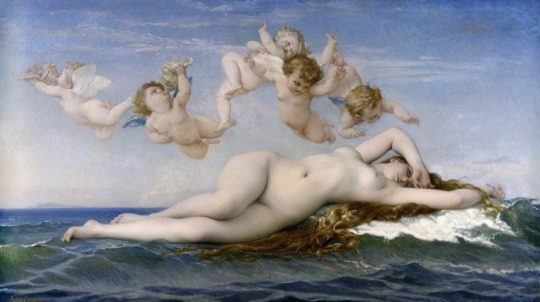

The Birth of Venus (painting), 1863.
by Alexander Cabanel.
#bookish#book review#reading#books#poetry#authors#book blog#booklr#writing#studyblr#book worm#books & libraries#greek mythology#history#art#art history#art blog#art gallery#art aesthetic#english literature#english#vintage#dark academia#academia#light academia#cottagecore#aesthetic#education#punk academia#mythology
861 notes
·
View notes
Text
I saw a post going around about costube historians analyzing period film costumes for accuracy and it kind of got under my skin, so I'm sitting down and writing ... not exactly a response to it, but a discussion of the topic.
(It would be a direct response except that I don't actually watch costube, because quite frankly I can't watch/listen to people discuss things I already know. And I don't want to be like "they don't do X!" when maybe they really do X and I'm just not aware. But a lot of the complaints hit the same points that have been brought up against fashion historians for reviewing costumes for decades. I would also note that I have looked into specific videos where there were claims of terrible costuber behavior and watched them and found nothing.)
If you're going to analyze a period film's costuming in any way, you should still interact with the historical aspect to some degree. If you want to talk about the use of bold stripes in Tim Burton's Sleepy Hollow, for instance, and you don't mention that they were in style during the period the film appears to be set in, it's kind of weird.
Likewise, yes, if you're critiquing primarily from the angle of historical accuracy, you should also engage to at least some extent with the reasoning behind the inaccuracy. If a reviewer doesn't do so at all, then yes, their review is probably not as good as it could be.
People pointing out an inaccuracy (or many inaccuracies) are not inherently scolding the costume designer. Even if their tone is something other than sweet. Sometimes they are scolding other people involved in the production, like the director who mandated a particular costume, or just a general notion of TPTB. Usually they are divorcing the art from the artist, though, and just reviewing the costuming from their particular viewpoint and knowledge base for a likeminded audience.
Sometimes, yes, they are complaining directly about the costume designer. This is not a crime. Some costume designers (for instance, Sandy Powell) have an incredible grasp on fashion history and excellent taste when it comes to diverging from it. Others simply don't have as in-depth of an understanding and make design decisions sometimes based on stereotypes and myths. Some costume designers will explain their decisions in interviews or blog posts and make it clear that they didn't make a truly informed decision about accuracy because they didn't know enough about the period. It's important for both sides of the equation to stop painting the other with too broad of a brush ("ivory-tower elitists who have no idea of a production's needs or budget" vs. "costumers who know how to sew but not how to do historical research").
If you're allowed to complain about a writer or a director or an actor doing something you don't like in a movie, you're also allowed to complain about a costume designer. You're allowed to have aesthetic preferences, and even to talk about them without hedging every five seconds to make it clear that others can disagree, although some of this is beneficial with any critique. Why would it be otherwise?
This seems really obvious to me, but maybe it's not? But "they costumed that female actor in an anachronistically sexy way because sex sells" is a feminist issue. The assumption that women's bodies should be sites of less-clothed allure while men's should attract by being more covered (with more layers than in modern dress, with cravats, etc.) is sexist. Complaints about female characters being costumed inaccurately are often being made along these lines, and pointing out that the producers insisted on it or something does not mean it's suddenly unproblematic that every female character deemed fuckable has to have low necklines at all times and modern shiny hair.
It's true that fiction isn't non-fiction and shouldn't be taken that way, but it's also demonstrably true that viewers do take cliches in film aesthetics as accurate when they see them enough times. People cite Scarlett O'Hara's 18" waist. They believe there were no bright colors before the 1920s and that women couldn't have put their hair up unless they were wealthy. These beliefs have consequences when it comes to public perceptions of history, and if films perpetuate them it's perfectly reasonable to point out that they support ideas about e.g. gender roles that trads express today.
It's also simply funny when a film's hair or costuming or makeup is supposed to evoke a lack of artifice but actually requires quite a bit of artifice because people don't naturally have perfect hair and skin and so on.
If you don't like reviews of period films that focus on the accuracy of the costuming, maybe ... don't watch/read reviews by fashion historians and historical costumers? At least unless they're vetted for you by someone who doesn't mind that?
#fashion history#historical fashion#costube#the original post I saw made me want to write a dozen reviews solely about the accuracy of costuming
84 notes
·
View notes
Text
The Secret History
Hi! I'm currently halfway through the book, and I thought I would share some reflections I've had about what I've read so far.
I find it absolutely fascinating how the story draws you in, and you unconsciously start resenting Bunny. You feel like he’s making everyone’s life impossible and that he’s half-crazy. But honestly, it’s wild because, at the end of the day, they’re all a bunch of unhinged people who’ve murdered someone—they’re literally killers! And the problem isn’t Bunny—it’s Richard, who just keeps living his life alongside them as if nothing happened, sharing his day-to-day with them without it affecting him at all. And, of course, the book is narrated by his future self, which is what gives you this initial perspective. Insanity how it all is written.
Bunny is the kind of person you could easily dislike in any other context because of his personality, his stupid jokes, and his overall vibe. But in this situation, you hate him because he’s losing it over the fact that his so-called "friends" (who end up killing him) are actual murderers.


I mean, they make him out to be this awful person, when the ones taking people's lives (just because they’re high out of their minds) are the others. And Richard narrates it all while siding with the murderers!?!? Like, the real problem is Richard. He’s the one who's messed up (honestly, it could be me).
So, here’s my reflection halfway through the book: if someone you care about, someone who’s part of your life, practically part of your daily routine, commits a murder or some other serious crime—would you be able to carry on normally with that person? Yes, they’ve committed a crime, but they’re still the same person you laugh with, talk to, and hang out with. It hasn’t directly affected your relationship or your life (beyond knowing and covering for it). So what do you do in that situation? Do you lose it like Bunny, or do you just go with the flow like Richard?


I mean, they’ve directly told you about it. You haven’t seen proof, nothing suspicious has happened, there’s been no change in their attitude, and it hasn’t altered your environment or the way you relate to them. Would the relationship stay the same? Would you really notice the difference? Or would it just remain as casual as someone telling you they bought a new car?!??
Obviously, the most logical thing would be to go to the police, but let’s ignore that part for now.
Let me know if you've got any other thoughts about it!
#the secret history#donna tartt#richard papen#bunny#bunny corcoran#henry winter#camilla macaulay#charles macaulay#dark academia#book review#books#aesthetic#light academia#art#words#dark acadamia quotes#quotes#writers and poets#poetry#bookblr#books and reading#booklr#reading#bookworm#writers on tumblr#halloween#black and white photography
77 notes
·
View notes
Text


the new yorker (2002)
#some good little things going on here: flansburgh is madonna. rare karen brown quote apparently?#some Bad little things: flansburgh absolutely has written and sung some of the band's greatest songs#I will not stand for the flippant flanslander that seems to plague potted histories of the band.#it's such a narrow view of their career and I don't know why reviews like this occasionally parrot it.#also some of their best-known songs by this point are ''puppet head'' and ''boss of me'' which flansburgh did (at least most of the former)#it's probably a bias of not bothering to check song credits and thinking#oh surely the Good song is by the one I've arbitrarily decided is the better one.#they're always like ''he's great at managing and talking'' which he is but it still manages to come across as backhanded.#take that 20+ year old article.#reviews also love comparing them to students. it's like. many journalists' reference point of any artsy individual.#tmbg#they might be giants#john flansburgh#john linnell#2000s#articles
68 notes
·
View notes